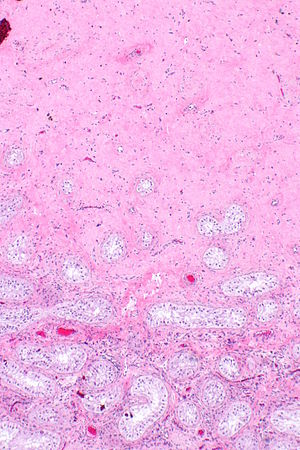Testicular scar
Jump to navigation
Jump to search
Testicular scar, also scar of testis, is a phenomenon that may arise in the context of treatment for a germ cell tumour[1] or result from the spontaneous regression of a (germ cell) tumour.[2]
| Testicular scar | |
|---|---|
| Diagnosis in short | |
 Testicular scar. H&E stain. | |
|
| |
| Synonyms | scar of testis |
|
| |
| LM | seminiferous tubules replaced by fibrosis (hyaline material with a relatively low cellularity and no nuclear atypia) +/-hemosiderin-laden macrophages, atrophic changes (see testicular atrophy) |
| LM DDx | necrotic tumour, (residual) testicular tumour (e.g. germ cell tumour) |
| Gross | tan brown or white, well-circumscribed |
| Site | testis |
|
| |
| Clinical history | +/-history of testicular tumour |
| Prevalence | uncommon |
| Blood work | unremarkable |
| Prognosis | benign |
| Clin. DDx | (residual) testicular tumour |
General
- Well-reported uncommon finding.
Gross
- Tan-brown or white lesion.
- Well-circumscribed.
Microscopic
Features:
- Seminiferous tubules replaced by fibrosis.
- Hyaline material with a relatively low cellularity and no nuclear atypia.
- +/-Hemosiderin-laden macrophages.
- Atrophic changes[2] - see testicular atrophy.
DDx:
- Necrotic tumour.
- Germ cell tumour, e.g. seminoma.
Sign out
TESTICLE, RIGHT, ORCHIECTOMY: - TESTICULAR SCAR REPLACING MANY OF THE SEMINIFEROUS TUBULES. - REMAINING SEMINIFEROUS TUBULES WITH ATROPHIC CHANGES. - BENIGN SPERMATIC CORD AND EPIDIDYMIS. - NO EVIDENCE OF RESIDUAL GERM CELL TUMOUR. - NEGATIVE FOR MALIGNANCY.
See also
References
- ↑ Ramsey S, Kerr G, Howard GC, Donat R (2013). "Orchidectomy after primary chemotherapy for metastatic testicular cancer". Urol. Int. 91 (4): 439–44. doi:10.1159/000350858. PMID 24021555.
- ↑ 2.0 2.1 Balzer BL, Ulbright TM (July 2006). "Spontaneous regression of testicular germ cell tumors: an analysis of 42 cases". Am. J. Surg. Pathol. 30 (7): 858–65. doi:10.1097/01.pas.0000209831.24230.56. PMID 16819328.